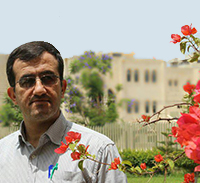Those, who do not make attempt, do not feel comfortable
Hamid Ghazvini
Translated by: Fazel Shirzad
2020-4-14
 ■The song of change and renewal of nature is heard from every direction, and spring presents its beauties.
■The song of change and renewal of nature is heard from every direction, and spring presents its beauties.
The air became Jesus, breath, and the dust, musk-diffusing
Green, the tree became; and into song the bird came[1]
(Hafez Shirazi)[2]
This spring, slowly and drunkenly, along with Eid al-Maba'ath[3] is celebrated, and it is a link between Iranian culture and prophetic tradition and bring a monotheistic worldview for all.
I'm happy in the world because the world is flourish from God
I love all the world because the world come from God[4]
(Saadi Shirazi)
Unfortunately, Iranian people, these days, have an uninvited stranger and gust, which has caused their suffering and sadness; it is an in interloper that sometimes results in death. This ominous gust tries to influence the spring and push away the happiness and flourishing. That is why, the first days of New Year have a different color and smell. On the one hand, pain, fever and shortness of breathiness, and on the other hand, sacrifice, resistance and service of members of the Health Front who have kept hope alive. This honor country has been repeatedly attacked by impostors and vulgarisms and enormous costs has been imposed to it , but Iran and Iranian people persist and continue to evolve. The life history of Iranian residents have shown that they were always defending themselves against any aggression targeted their nature and essence; thy used it as an opportunity to grow. That is why, I believe that Iran's cultural and civilizational background is a valuable asset to overcome this crisis.
For the next few weeks, the Corona virus will left here, and these hard times will be ended. On that day, another glorious page will be added to the Iranian life history. This time is an important experience in storing the knowledge of the people of this country.
Do not complain about the sadness in the way of desire
Those, don’t make attempt, don’t feel comfortable
(Hafez Shirazi)
[1]Original Translated by Wilberforce Clarke (1870-1905).
[2] He, known by his pen name Hafez and as "Hafiz", was a Persian poet who "lauded the joys of love and wine but also targeted religious hypocrisy".
[3] That is, Muhammad's revelation, an event described in Islam as taking place in 610 AD, during which the Islamic prophet, Muhammad was visited by the archangel Jibrīl, known as Gabriel in English, who revealed to him the beginnings of what would later become the Qur’an.
[4] This poem has been written by Saadi, also known as Saadi of Shiraz, was a major Persian poet and prose writer of the medieval period. He is recognized for the quality of his writings and for the depth of his social and moral thoughts
Number of Visits: 4492








The latest
- Analyzing the Impact of Sacred Defense Memories on the New Generation: Usage in Transmitting Values
- The Sha‘baniyya Uprising as Narrated by Ali Tahiri
- 100 Questions/16
- Third Regiment: Memoirs of an Iraqi Prisoner of War Doctor – 16
- 100 Questions/15
- Comparison of Official (Institutional) Oral History with Unofficial (Popular/Personal) Oral History
- The Three Hundred and Seventy-Third Night of Remembrance – Part One
- Third Regiment: Memoirs of an Iraqi Prisoner of War Doctor – 15
Most visited
- The Artillery of the Islamic Revolutionary Guard Corps
- Translation in Oral History and Its Potential Pitfalls
- A Critical Look at Pioneers of the Valley of Light
- Third Regiment: Memoirs of an Iraqi Prisoner of War Doctor – 15
- Comparison of Official (Institutional) Oral History with Unofficial (Popular/Personal) Oral History
- The Three Hundred and Seventy-Third Night of Remembrance – Part One
- 100 Questions/15
- Third Regiment: Memoirs of an Iraqi Prisoner of War Doctor – 16
Omissions in the Editing of Oral History
After the completion of interview sessions, the original recordings are archived, the interviews are transcribed, proofread, and re-listened to. If the material possesses the qualities required for publication in the form of an article or a book, the editing process must begin. In general, understanding a verbatim transcription of an interview is often not straightforward and requires editing so that it may be transformed into a fluent, well-documented text that is easy to comprehend.100 Questions/8
We asked several researchers and activists in the field of oral history to express their views on oral history questions. The names of each participant are listed at the beginning of their answers, and the text of all answers will be published on this portal by the end of the week. The goal of this project is to open new doors to an issue and promote scientific discussions in the field of oral history.The Role of Objects in Oral Narrative
Philosophers refer to anything that exists—or possesses the potential to exist—as an object. This concept may manifest in material forms, abstract notions, and even human emotions and lived experiences. In other words, an object encompasses a vast spectrum of beings and phenomena, each endowed with particular attributes and characteristics, and apprehensible in diverse modalities.100 Questions/6
We asked several researchers and activists in the field of oral history to express their views on oral history questions. The names of each participant are listed at the beginning of their answers, and the text of all answers will be published on this portal by the end of the week. The goal of this project is to open new doors to an issue and promote scientific discussions in the field of oral history.

